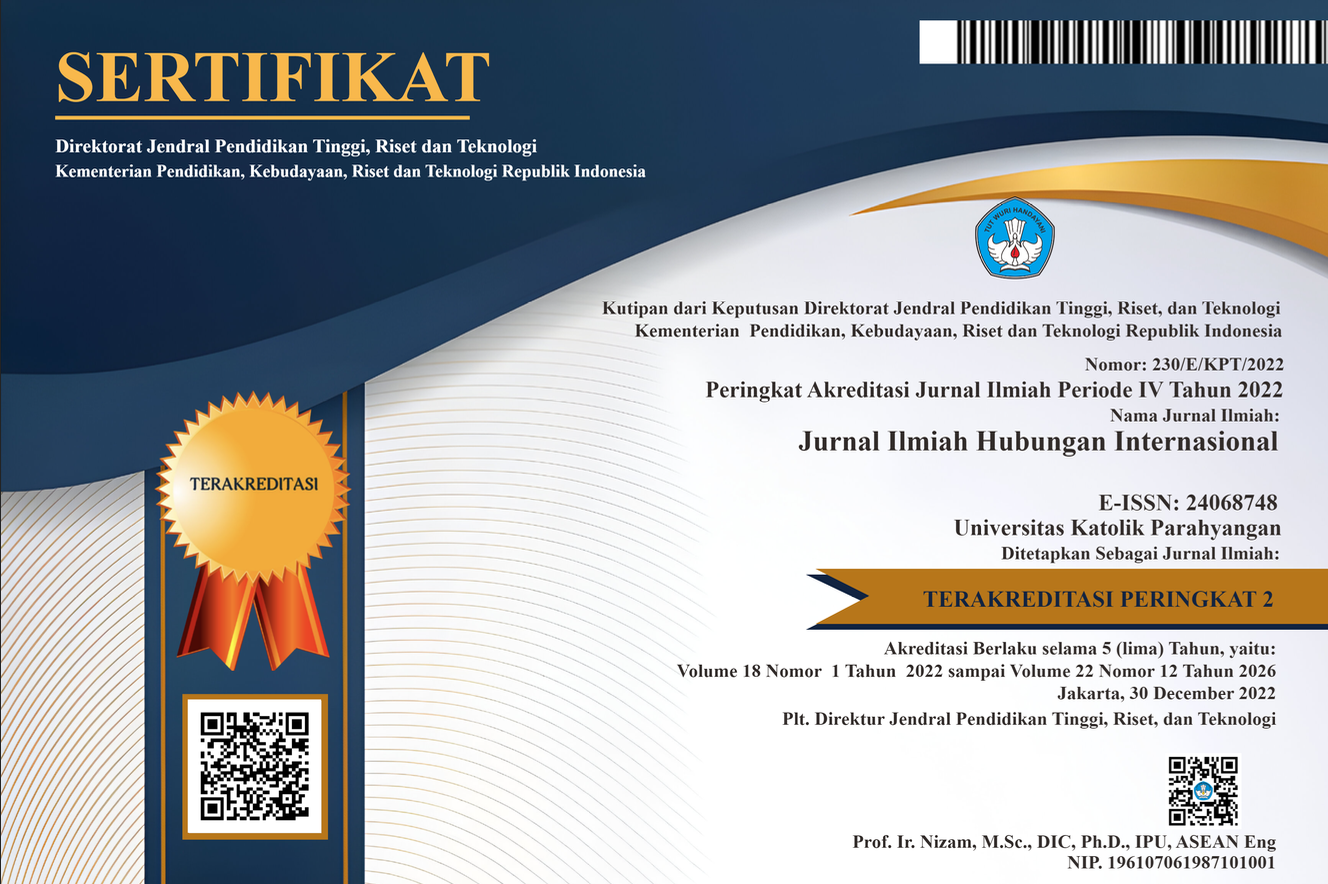Efektivitas Friends of Nature dalam Meningkatkan Kesadaran Lingkungan di Tiongkok
DOI:
https://doi.org/10.26593/jihi.v12i2.2652.175-187Abstract
Isu lingkungan menjadi perhatian publik Tiongkok sejak dekade 1990-an yang turut dipantik oleh berdirinya Friends of Nature (FON) sebagai organisasi lingkungan legal pertama di Tiongkok. Meskipun Tiongkok merupakan negara yang sangat membatasi pergerakan sosial, penerapan undang-undang tentang syarat-syarat berdirinya organisasi kemasyarakatan merupakan salah satu alat hukum bagi legalisasi FON. Dengan regulasi yang ketat dan standardisasi yang tinggi, FON menjadi masyarakat sipil global (MSG) dengan perolehan massa dan sumber dana besar, kontinyuitas agenda yang terjaga, prestis tinggi di dunia internasional, dan perlindungan secara politis dari pemerintah. Peran media dan jaringan yang dibentuk oleh FON juga menjadi faktor bagaimana FON dapat menjadi lebih efektif. Tulisan ini membahas mengenai efektivitas MSG dalam mencapai tujuan-tujuannya. Efektivitas yang dimaksud bukan merujuk pada FON merupakan MSG yang efektif atau tidak dalam menjalankan strategi tetapi mengenai bagaimana FON menjalankan strategi-strateginya untuk dapat bekerja secara lebih efektif dalam mencapai tujuannya.
Kata-kata kunci: Friends of Nature, pemerintah, regulasi, massa, sumber dana, strategi, efektivitas
References
Buku dan Artikel dalam Buku
Amoore, Louise & Langley, Paul. 2004. “Ambiguities of Global Society”, Review of International Studies 30 (1): 89-110.
Carothers, Thomas, 1999-2000. “Civil Society”, Foreign Affairs, Winter 1999-2000: 18-29.
Gunter, Michael M., Jr. & Ariane C. Rosen, 2012. “Two-Level Games of International Environmental NGOs in China”, Policy Review, 3: 270.
Hegel, G.W.F., 1991. Elements of the Philosophy of Right. Cambridge: Cambridge University Press.
Jaffe, Amy Myres & Kenneth B. Medlock III, t.t. China and Northeast Asia.
Schwartz, Jonathan, 2004. Environmental NGOs in China: Roles and Limits. State University of New York.
Tsutsui, Kiyoteru and Christine Min Wotipka. 2004. “Global Civil Society and the International Human Right Movement: Citizen Participation”, in Human Rights International Nongovernmental organizations, Social Forces 83 (2): 587-620.
Wen'an, Hu, "Ziran zhiyou" ("Friends of Nature"), in Wang Ming (ed.), Zhongguo NGO yanjiu (Studies of NGOs in China).
Wu, Hsiang-Yuan, t.t. NGOs in China: The Case of Friends of Nature (FON, 自然之友). University of Washington.
Yang, Guobin, 2005. “Environmental NGOs and Institutional Dynamics in China”, The China Quarterly, No. 181 (Mar., 2005), pp. 46-66.
Artikel Online
China Internet Network Information Center (CNNIC), n.d. [WWW]. Available from: https://www.cnnic.net.cn/IDR/hlwfzdsj/201306/t20130628_40563.htm [Accessed: 30/08/16].
Perkuliahan
Dharmaputra, Radityo (2014) Masyarakat Sipil Global (SOH404): The Global & Private Targets of GCS (week 6) FISIP Universitas Airlangga, A-310 on 18 April 2014. Available from: Powerpoint [Accessed 18/04/14].
Dugis, Vinsensio (2014) Masyarakat Sipil Global (SOH404): Menyoal Efektivitas MSG (week 9) FISIP Universitas Airlangga, A-310 on 9 May 2014. Available from: Lecture [Accessed 09/05/14].
Dugis, Vinsensio (2014) Masyarakat Sipil Global (SOH404): What Is Global Civil Society? (week 2) FISIP Universitas Airlangga, A-310 on 14 March 2014. Available from: Lecture [Accessed 20/03/14].
Downloads
Published
How to Cite
Issue
Section
License
This journal uses Creative Commons license (CC BY). We allow readers to read, download, copy, distribute, print, search, or link to the full texts of its articles and allow readers to use them for any other lawful purpose. The author must be aware that the article copyrights will be fully transferred to Jurnal Ilmiah Hubungan Internasional only if the article is accepted to be published in the journal through signing of the Copyrights Transfer Agreement. Authors are allowed to resend their manuscript to another journal or intentionally withdraw the manuscript only if both parties (JIHI and Authors) have agreed on the related issue. Once the manuscript has been published, authors are allowed to use their published article under Jurnal Ilmiah Hubungan Internasional copyrights.








